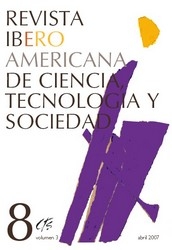Democracy at the Border
DOI:
https://doi.org/10.52712/issn.1850-0013-949Keywords:
science policy, citizens’ participation, democratization of scienceAbstract
In this article the author carries out a critical review of the main arguments usually use in favour and against the opening of the policies of science and technology to the citizen participation. This examination is preceded by a brief reflection on the conceptual foundations of the challenge of the democratization of science, as well as on the senses under which it is possible to understand such challenge. The essay sets out to make a contribution towards a philosophy of scientific policy.
Downloads
References
BELL, D. (1973): El advenimiento de la sociedad post-industrial, Madrid, Alianza, [1991].
BERLIN, I. (1990): El fuste torcido de la humanidad, Barcelona, Península, [1992].
BUSH, V. (1945): Science - The Endless Frontier, Washigton DC, National Science Foundation.
COLLINS, H.M., EVANS, R. (2002): “The Third Wave of Science Studies: Studies of Expertise and Experience”, Social Studies of Science, 32/2: 235-296.
CORBURN, J. (2005): Street Science: Community Knowledge and Envorinmental Health Justice, Cambridge, MIT Press.
DUNN, W.N. (1981/2004): Policy Analysis: An Introduction, 3ª ed., Upper Saddle River, NJ: Pearson-Prentice Hall.
ECHEVERRÍA, J. (2001): “Ciencia, tecnología y valores. Hacia un análisis axiológico de la actividad tecnocientífica”, en A. Ibarra y J.A. López Cerezo (eds.), Desafíos y tensiones en Ciencia, Tecnología y Sociedad, Madrid, Biblioteca Nueva.
EPSTEIN, S. (1996): Impure Science: AIDS, Activism, and the Politics of Knowledge, Berkeley, University of California Press.
FECYT (2005): Percepción social de la ciencia y la tecnología en España 2004, Madrid, Fundación Española para la Ciencia y la Tecnología.
FIORINO, D.J. (1990): “Citizen Participation and Environmental Risk: A Survey of Institutional Mechanisms”, Science, Technology, and Human Values 15/2: 226-243.
FISCHER, F. (2000): Citizens, Experts, and the Environment: The Politics of Local Knowledge, Durham-Londres, Duke University Press.
FRODEMAN, R., Mitcham, C. (2004): “New Directions in the Philosophy of Science: Toward a Philosophy of Science Policy”, Philosophy Today 48: 3-15.
FUNTOWICZ, S.O., RAVETZ, J.R. (1990): Uncertainty and Quality in Science for Policy, Dordrecht, Reidel.
GUSTON, D. (1999): “Evaluating the First U.S. Consensus Conference: The Impact of the Citizens’ Panel on Telecommunications and the Future of Democracy”, Science, Technology and Human Values 24/4: 451-482.
GUSTON, D.H., KENISTON, K. [eds.] (1994): The Fragile Contract: University Science and the Federal Government, Cambridge, MIT Press.
JASANOFF, S. (1995): “Procedural Choices in Regulatory Science”, Technology in Society 17: 279-293.
JASANOFF, S. (2005): Designs on Nature: Science and Democracy in Europe and the United States, Princeton, Princeton University Press.
LONGINO, H.E. (2002): The Fate of Knowledge, Princeton, Princeton University Press.
LÓPEZ CEREZO, J.A. [ed.] (2003): La democratización de la ciencia, San Sebastián, Erein.
MAYO, D.G., HOLLANDER, R.D. [eds.] (1991): Acceptable Evidence: Science and Values in Risk Management, Oxford, Oxford University Press.
MUÑOZ, E. (2005): “Gobernanza, ciencia, tecnología y política: trayectoria y evolución”, Arbor 715: 287-300.
NATIONAL RESEARCH COUNCIL (1996): Understanding Risk: Informing Decisions in a Democratic Society, Washington, D.C., National Academy Press.
PERHAC, R. M. (1998): “Comparative Risk Assessment: Where Does the Public Fit In?”, Science, Technology and Human Values 23/2: 221-241.
PFEFFER, N. (1987): “Artificial Insemination, In-vitro Fertilization and the Stigma of Infertility”, en M. Stanworth (ed.), Reproductive Technologies: Gender, Motherhood and Medicine, Minneapolis: University of Minnesota Press.
PLATÓN (1966): Obras completas, Madrid, Aguilar.
RAWLS, J. (1971): Teoría de la justicia, México DF, FCE, [1979].
RENN, O., WEBLER, T., WIEDEMANN, P. [eds.] (1995): Fairness and Competence in Citizen Participation, Dordrecht, Kluwer.
ROW, G., FREWER, L. (2005): “A Typology of Public Engagement Mechanisms”, Science, Technology and Human Values 30/2: 251-290.
ROW, G., FREWER, L. (2000): “Public Participation Methods: A Framework for Evaluation”, Science, Technology and Human Values 25/1: 3- 29.
SAREWITZ, D. (1996): Frontiers of Illusion: Science, Technology, and the Politics of Progress, Filadelfia, Temple University Press.
SEBASTIÁN, J., MUÑOZ, E. [eds.] (2005): Radiografía de la investigación pública en España, Madrid, Biblioteca Nueva.
SHRADER-FRECHETTE, K. (1991): Risk and Rationality: Philosophical Foundations for Populist Reforms, Berkeley, University of California Press.
TODT, O. (2003): “Potencialidades y riesgos de la participación”, en J.A. López Cerezo [ed.] (2003): La democratización de la ciencia, San Sebastián, Erein.
ZACHARY, G.P. (1999): Endless Frontier: Vannevar Bush, Engineer of the American Century, Cambridge, MIT Press.
Downloads
Published
How to Cite
Issue
Section
License
Copyright (c) 2025 CC Attribution 4.0

This work is licensed under a Creative Commons Attribution 4.0 International License.
All CTS's issues and academic articles are under a CC-BY license.
Since 2007, CTS has provided open and free access to all its contents, including the complete archive of its quarterly edition and the different products presented in its electronic platform. This decision is based on the belief that offering free access to published materials helps to build a greater and better exchange of knowledge.
In turn, for the quarterly edition, CTS allows institutional and thematic repositories, as well as personal web pages, to self-archive articles in their post-print or editorial version, immediately after the publication of the final version of each issue and under the condition that a link to the original source will be incorporated into the self-archive.











